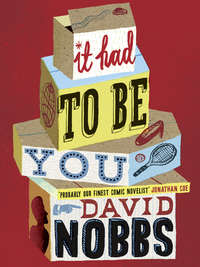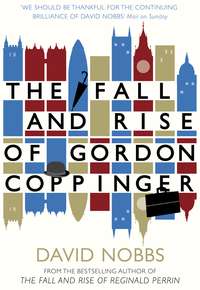
Полная версия
The Itinerant Lodger
Chapter 4
NOT SINCE MR JENNINGS HAD MRS POLLARD FELT SO much concern over a stew. She wanted to make Barnes a stew that he would never forget, a stew that would help him to overcome his worries and inspire him to write his poems. She opened the door of the fridge and gazed at the frosted wonderland inside. She went to the cupboard and peered at the rows of smiling edibles that stood in its dark, spicy depths. And she realised that for the first time in her life she was at a loss where to begin.
In desperation she consulted Thorneycroft’s Thought For Food and started to read Chapter One: “Your Guest Arrives”. She had never before sought the advice of the great culinary philosopher and gastrophile, but then she had never before been at a loss. In the past her stews had just happened. One minute they had not been there and the next minute, hey presto, there they had been.
The most important thing to consider, in choosing a menu, was the nature of the person who would eat the food. However carefully prepared, however exquisitely cooked, however delightfully presented a meal might be, it could not be a complete success unless it was served to the right person, said Thorneycroft, and Mrs Pollard believed him. But although he gave examples of kinds of people—the ascetic scholar was one, and the young executive was another—none of them were remotely like Barnes. What kind of a person could he possibly be? She turned to the chapter on stews, but to no purpose. Each recipe was absolutely delicious, of that she had no doubt, but which of them was right for her Barnsey?
In the end she had to abandon the book—a Christmas present—and return to her shelves. But it was no use. She was quite incapable of deciding which ingredients to use, and eventually, with a sudden despairing decision she relinquished control of her faculties and flung into the casserole the first objects that came to hand—some capers, an onion, some stewing beef, a sprig of tarragon, a lobster, some plums, and a sheet of gelatine. Onto all that she poured some stock.
While these ingredients were settling down she went to Barnes’ room and asked him about the garlic, and then, after she had returned and added the garlic, she tasted the stew. It was displeasing. She fetched from the larder a bay leaf, some more stewing beef, a bottle of sherry, another onion, and some carrots. She put a spoonful of sherry and the carrots into the stew, tasted it again, and grimaced. It still displeased her, though not so strongly as before.
At first she was not unhappy. She was performing a heroic holding action, and it occupied all her energies. But when she had tried every imaginable combination of ingredients, and the stew had still not become more than a pathetic shadow of the feast on which she had set her heart, she grew very depressed. She went to see Veal, as was her custom when things became too much for her.
She climbed slowly the dark, narrow, creaking staircase. She was panting and having great difficulty in breathing and before she entered his room she waited for it to die down.
Veal was asleep, and Mrs Pollard sat quietly for a few minutes on a wooden chair at the side of his bed. Then, when she felt calmer, she adjusted his sheets and tidied the bottom of his bed, making sure that the blankets were properly tucked in. She brushed his shoes, wound up his alarm clock, made certain that his suitcases were arranged in inverse order of size, and then stood at the bottom of the bed and looked down on him where he slept. She stood there for a few moments, and then she realised with a shock that she had been thinking of other things—of Barnes, of the stew, and of how she could make things easier for him in a thousand little ways.
She hastened downstairs and began once more to taste the stew. She did so with horror. She had hoped that in the interim it might have matured, or that, returning to it after a breather, she would find that her fears had been exaggerated. But it seemed, if anything, even less tasty than before. It was very far from being the ideal stew after which she had hankered.
She realised now, when it was too late, that the success of a stew depends not so much on the nature of the ingredients as upon their relationships among themselves, one to another. The sweetest carrot tastes bitter inside a camembert. At first the introduction of ingredients into the casserole had improved the stew, but only at first. She had introduced too many, far too many, so that it had become a struggle for survival down there in the cauldron. It would be difficult to state the exact moment at which the stew had ceased to improve, and had begun to deteriorate. Very likely it was with the introduction of the lobster. Anyway Mrs Pollard became certain that, could she but remove the lobster, the dish would become, if not ideal, at least edible. The lobster, however, had disintegrated, as lobsters will, given the slightest encouragement, and had permeated the stew to such an extent that not only was there nothing which could be said to be the lobster, but there was nothing that could be said not to be.
The only thing for it was to remove from the wreckage those objects which she judged most likely to be completely distasteful, and which were still sufficiently whole to be distinguishable—the sprig of tarragon, for instance. After removing each object she tasted the remainder and to her delighted surprise it began to grow more and more edible. With increasing excitement she removed objects and with increasing relish she tasted what was left. Really, it was almost delicious. She removed something which looked suspiciously like a burnt carrot, and ate another spoonful. She decided that it was perfect. At last! She had done it, and she could have cried for joy.
It was at this moment that she discovered that not a morsel of stew remained. She had just eaten the last spoonful.
Chapter 5
FOR A FEW MOMENTS HER HAND QUIVERED ON THE knob of his door, but she exerted no pressure, and the handle did not turn. Her stomach felt hollow. Her hands were weak. Once or twice she wavered, as if she was plucking up her courage and determining to walk boldly into his room and tell him the terrible news, but in reality she already knew that she would not.
She walked slowly through the kitchen, past the dying fire and the deserted knitting basket, and crept up the narrow staircase. Up there, separated from Veal by a thin and peeling wall, she lay wakeful. In the distance a steel bar was being hammered upon her forehead, and nearer at hand, a long while later, she heard a jangled squeak, as Barnes converted his sofa into a bed.
For he had noticed suddenly that the fire had gone out. He stood up, stretched painfully, and creaked into the kitchen. All round the range stood pots and pans and tins, and there, in the centre, was the empty, unwashed casserole. It was most strange.
Hunger was biting into him, and furtively he found some bread and ate three slices, dry. After that there was no point in staying up, so he cleaned his teeth, undressed, placed his clothes untidily over the back of his wooden chair, tightened the cord of his pyjamas, converted his sofa into a bed, and crept into it. The moon rose in a sky that was cold and hard and empty at last of snow. The trees drooped under the weight of the snow that had fallen, and there was no movement anywhere. He drifted towards sleep without reaching it, and he settled down for a long vigil, gazing at the ceiling till his eyes smarted, remembering the nights when it had thundered and he had longed to lie warm and crumpled beside whatever mother he had at the time. In this way he came near to the warmth of sleep, and then suddenly he was awake again, and there it was inside him, happiness. It forced him out of bed and sent him scampering to the window.
The moon was falling over the bare top of a hill, and light fingers of cloud were stretching wakefully across the sky. A grey light was beginning to spread from the east, and from the earth a thin steam was rising and dying as it rose. Mists began to gather and the sky turned slowly orange. Here and there a bird sang in surprise at finding itself alive on such a morning, after the storm.
The morning! In the morning he would start to discover the purpose of existence. It was not here, in this dingy room. It was not inside himself. It was not to be found through the rarefied isolation of artistic creation, even if what he had produced had been art. He realised that now. It was out there on the sides of the hills, where people lived, and in the factories, where they worked. He must work, feel himself useful, and embark upon a voyage of discovery. In the morning he would find himself a job. In the morning he would thrill to the vibrant excitement of human activity. In the morning he would become a new man, Fletcher.
Meanwhile he closed the curtain and went back to bed, and fell, like Mrs Pollard, into a kind of sleep.
Chapter 6
FLETCHER EMERGED THREE HOURS LATER IN A MANNER that astounded Mrs Pollard. His face, taking cheerfulness almost to the point of no return, carried all before it in a manner that she had not seen from him before. In her embarrassment she assumed that he would mention the events of the previous evening, but he made no reference to them. Rather he announced his intention of taking a short walk before breakfast. This could have knocked Mrs Pollard over with a feather. Judge then of her shock when she saw him leap down the steps in one bound and set off in the general direction of the Midland Station at a pronounced trot, rubbing his hands eagerly together.
She couldn’t understand it, and she didn’t like it. He had never taken a walk at any time, let alone before breakfast, and he had certainly never rubbed his hands together when she was looking. However, there was no time to worry about that. She must make him his breakfast. Stew.
It was not the usual thing for breakfast, but she felt that there would be no peace between them until she had redeemed herself. She decided, having learnt from her mistake, to aim at something simple, and she chose from her larder onions, potatoes, carrots, stewing beef and haricot beans. Onto these she poured a generous proportion of stock. Next she secured to the floor, at a yard’s distance from the casserole, a wooden chair, and she then sat on it. She began to stir the stew. This she did with an enormous spoon. It really was enormous, for a spoon. One would have been excused had one mistaken it for a dredging bucket. This spoon, this great spoon, had once belonged to Builth Evans, of the Merioneth Axe Murders, and had become a valuable family heirloom. Mrs Pollard, who was descended from the Evanses on her grandmother’s side, was extremely proud of the spoon, and had made a will bequeathing it to the Victoria and Albert Museum in London, should it survive her. It was over four feet long and had at its head a curious double joint, characteristic of the best Welsh domestic spoons. The purpose of this joint was to allow the spoon to lie in the vertical while the handle was in the horizontal position, and vice versa. When the handle of the spoon was wiggled, the wiggle communicated itself, via the joint, to the spoon, thus setting up a cross-wiggle. The result was a stir only slightly inferior to that obtainable with any other spoon.
Mrs Pollard believed that by thus employing the spoon she was making it useful, and that it was therefore a boon to her, in that it was of use. Wearisome and clumsy though her efforts were, she firmly believed that she was using a labour-saving device.
Fletcher, in the meantime, was advancing by leaps and bounds, as he grappled with the problems involved in discovering a new city. His nervous excitement led him on a prodigious walk, up and down the hills, through parks, past quaint old pubs and great modern stores, the dreams of master hacks. On all sides stretched streets of square brick houses, appealing or appalling, according to one’s spelling. Eventually, at the end of one of these streets, he came upon a vista. Below him lay the valley and the factories, and on the other side of the valley a belt of derelict open spaces and car parks threaded its way into the centre of the city and petered out among a mass of printing presses, garages and canteen windows. Beyond them, on the right, rose the towers and spires of the principal buildings.
Fletcher stopped walking and leant against the wall, looking out over this new land. The city was given over, in the main, to heavy industry. A hundred years ago, he mused, it had been little more than a collection of villages, each with its own peculiar customs and institutions. Now it housed, he estimated, some half a million souls, several of them taxi-drivers, others lawyers, journalists, smelters and so on, down through the whole gamut of human activity. There was not much here, he judged, to attract the tourist, but there was a thriving air of activity which would no doubt compensate for the lack of historical interest and beauty. The inhabitants, he felt sure, retained the traditions of independence and individuality which their manly life had given their forefathers.
It was to be his domain! In this great city lay his life’s work. He strode on, past the Salvation Dining Rooms, the Midland Station, the Hippodrome Cinema, the Telegraph and Chronicle Building and the Temperance Launderette. He passed the imposing façade of the Neo-Gothic Town Hall, on whose well-kept lawns summer time crowds enjoyed, in son et lumière, the dramatised history of the Chamber of Commerce. He passed the sandstone and soot cathedral and the Northern Productivity Pavilion, and the whole bustle of the early-morning life of the city fired his imagination. He drank in the atmosphere as if he could not have enough of it. It was a beautiful morning. Quite soon it would snow, but at this moment the sun, high above the slate roofs, was shining on the upturned faces of the buses. The city was full of noise. The market was situated on the hill. The politicians were driven in the big, black cars. The pencil was in the pocket of the publican. The tourist was purchasing a tin of luncheon meat. The street trader was displaying many kinds of produce. The townsfolk were travelling to work. See, the merchant has raised his glass and is drinking. Why, the newsvendor is selling those journals with ease.
So the city went about its business, and Fletcher watched. This was the promised land, and it seemed natural that a military ceremony should take place and martial music should sweep him into battle. He was not certain of the purpose of the parade, nor did he know the identity of the elderly lady who stood in the uniform of a field marshal on the dais, but he stood near her and watched the troops march past. Contingent after contingent swept by in perfect step. The sun shone on the green berets of the Third Battalion the Queen’s Own Mexborough Fusiliers and glinted off the campaign medals on the chests of the Old Comrades and the veterans of Ladysmith. There was cheering from the crowds as the military bands played and swept Fletcher towards his duty. There was so much that must be saved. As he marched he saw the world waiting to be saved. Africa, Asia, America, Europe. Mountains, rivers and forests. Rivers running through the forests. Mountains emerging out of the forests. Fletcher running through the forests. Fletcher emerging out of the forests. Fletcher at the summit, on the raised dais. Fletcher, the universal panacea for all mankind.
The bands stopped. The ceremony was over. He must get a job, and he set off down the hill and bought a copy of the Telegraph and Chronicle.
Chapter 7
TELEPHONISTS REQUIRED. APPLY IN WRITING TO Deputy Superintendant of Communications, Northern Lead Tubes Ltd., stating age, experience and details of National Automatic Dial Proficiency Tests passed.
Museum attendants wanted. Apply Box 80.
Are you an enthusiastic, ambitious and healthy university graduate, with an alert mind, a penchant for new gimmicks, a driving licence, and a solid grounding in the container production industry, who welcomes innovations, believes in expansion, can mix with industrial leaders, speaks Flemish, has advanced views on lid design and would be prepared to share bathroom with radiator mechanic? If so, apply Personnel Manager, the Conical Canister Corporation.
Applications are invited from those qualified to fill the post of CHIEF ENTOMOLOGIST at Badi El Swami Agricultural Research Centre, in the Republic of the Sudan. The selected officer would be expected to unify existing research on insect migration, and must have first-hand knowledge of tropical spiders and modern methods of aerial spray. Starting salary £1,750.
Spoon roughers and insiders, throstlers and large ingot men required. Apply British Watkinson Dessert Spoons and Sons.
Bus conductors required by City Corporation. Apply Ledge Street Garage.
Fletcher felt depressed after reading this list. It was not much use knowing that British Watkinson Dessert Spoons and Sons required spoon roughers and insiders, throstlers and large ingot men, unless you were a spoon rougher and insider, a throstler, or a large ingot man. But if you were any of these you would almost certainly have a job already, and so it was with every other one of the vacancies on the list. They demanded that you were already what they offered that you should become, and Fletcher, whose life consisted so largely of wanting to be what he was not, felt at a distinct disadvantage.
The only thing to do, he decided, was to apply for those jobs where the gap between their requirements and his capabilities seemed least. Obviously there was no chance of his becoming a Chief Entomologist, and he had never passed any Automatic Dial Proficiency Tests. He might have been designed as the direct opposite of what was required by the Conical Canister Corporation, and as for British Watkinson Dessert Spoons, he did not even know the meaning of most of the words in their advertisement.
No, it would have to be either a museum attendant or a bus conductor. It hardly mattered which, really. It was the fact of working, the fact of being of service, of fulfilling a function in the bustling city world, that mattered. Yet the fact that a decision is unimportant does not make it any easier to reach, and he was relieved when Mrs Pollard spoke.
“Not found much?” she asked.
“No. It seems to be either a bus conductor or a museum attendant.”
“I don’t know why you don’t go back to teaching.”
“I wasn’t very successful as a teacher.”
“I’m sorry to hear it.”
“I couldn’t cope.”
“What a shame.”
“So it seems to be either a bus conductor or a museum attendant.”
“Very bad for the health, these museums. It’s one thing to look round them and another thing to actually live there.”
“Yes.”
“I knew a man who worked in one. He caught Egyptology disease. He was very well preserved, for his years, but as dead as they come. It’s his wife I’m sorry for. You never know how you might end up, if one of those places got a hold over you.”
“Yes.”
“Of course there are the treasures. You can’t say that about a bus.”
“No.”
“You don’t get the exhibits on a bus. Or the coins. It’s just pennies, threepences and sixpences there. No variety. But then again you never know where you are with it in these museums. Roman coins, Saxon coins, everything.”
“Yes.”
“I mean you could go for the museums if you wanted to.”
“Yes.”
“But you know where you are on the buses. I’d choose the buses, if I were you.”
Chapter 8
THE INTERVIEW RAISED NO PROBLEMS AT ALL, MUCH to his surprise, and he formed the impression that it was easy to become a bus conductor, much easier than it was not to. The next morning he reported for training, and in common with about twenty-five other “new boys” he saw a series of films demonstrating the right and wrong ways of preventing dogs from sitting downstairs, ejecting spitters, recognising Irish coins and asking for the correct change without giving offence. Within two days he had been assigned to his route—the 92, from Woodlands to Pratts Lane Corner, via City—and had learned the fares between every fare stage on the route, in both directions.
On his first day of full duty he presented himself at the Ledge Street Garage at 5.27 a.m. It was a cold, windy morning, with flurries of tiny snowflakes. He was introduced to his driver, 3802 Driver Foster, a surly man who didn’t even wave to the other drivers on his route, and then he entered the bus. He felt acutely conscious of himself in this strange uniform and wished only that the bus would open and swallow him up. When he was younger he had assumed that his nervousness would abate as he grew older. Now, when he was older, he found that his inexperience in each new job seemed even more noticeable and ludicrous, and he felt more nervous than ever.
Driver Foster started his engine with a cold ruthlessness that served only to mock his fears, and the great vehicle nosed slowly out of the garage and set off down the open road. At first there were only a few early-morning workers on the bus, but gradually it filled up with rush hour crowds and Fletcher’s nervousness began to abate. He began to feel that joy which always came to him while working. He was in on the great struggle, helping. There was an orderly routine about his work which provided him with a sense of comfort and security. The duties were onerous enough to give him a constant sense of his usefulness without being so onerous as to induce nervous prostration. Up there in the grim loneliness of his cab Driver Foster treated each day as a battle, giving and asking no quarter and regarding it as a major defeat if he was forced to give way at a pedestrian crossing, especially to women with prams. In the crowded sociability of the lower and upper saloons, however, life was more than a battle. It was a crusade. Fletcher had suddenly realised that human life consists of a never-ending struggle to be in the right place at the right time. Each busload that he carried on the 92 route became, to his romantic imagination, a vital contribution towards ending that struggle. One day, if he worked hard, there would come a time of magic equilibrium, when everyone was already where he wanted to be.
And how hard he worked! What crowds he carried! He found it impossible to turn people away from his bus, when there was this great struggle to be won. He wanted to serve everyone, without distinction of class, creed, race or time of arrival. He believed in the freedom of the individual, pending the arrival of the purpose of existence.
Fletcher was thorough rather than swift. He found it difficult to collect all the fares even under normal conditions, and when his bus was particularly full he found it impossible. The rush hour crowds soon learnt that there was a distinct possibility of a free ride, and Fletcher’s bus began to grow fuller still. Even more free rides were to be had, and even greater crowds were attracted. Soon the Inspector heard tales of the strange bus on route 92. He decided to inspect it.
The Inspector was a tall, tightly knit man, like an old walking stick, with grim caustic eyes set deep into his grizzle. Born to inspect, he had not been slow to do so. But he had never felt his sense of vocation so strongly as he did that cold windy morning, as he stood in front of the Pike House, waiting.
The Inspector signalled Fletcher’s bus to a halt, and when he had boarded it—no easy matter, this, for the platform was crowded with passengers, he looked around for Fletcher. In vain. There was not a Fletcher to be seen. He noticed that none of the people who were thronging the corridor and stairs had any tickets, and the harsh gleam of inspection lit up his eyes. His face narrowed until it became as long as it had been broad, his eyes became slits and his lean nose was raised and thrust forward. He was a hound which had found the scent, and he would have bayed, had it been possible to do so with dignity.
“Where is the conductor?” he asked in a crisp, dry, thinly-sliced, unbuttered voice. A few heads turned slowly towards him and he repeated: “Where is the conductor?” There was something terrible about the man’s inflexibility.







